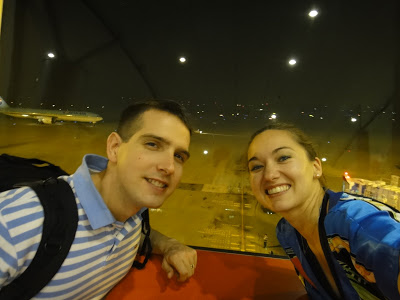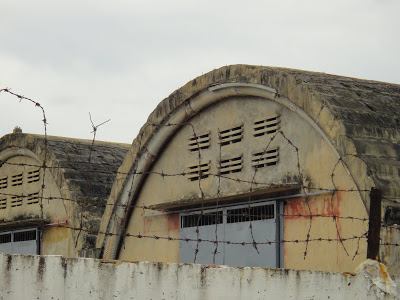 We’d hoped to go to the beach; again, it was raining. Then our incomprehensible tour guide called to haggle over our final afternoon’s itinerary. All in all, it was shaping up to be a crappy last day of vacation. I felt resigned as our car arrived. We proceeded to Da Nang’s China Beach as planned. Garbage, stray animals, debris, depressing mess, and old round fishing boats filled with nets were scattered along and above the high-tide line. The boats were well-used and looked very…Vietnam. From there, Chris wanted to stop for a final look at an old US Marine base where his dad was based during the war. Chris and the guide walked along the compound’s outer the wall while I watched two ladies in conical hats and plastic ponchos harvesting herbs between the broken cement littering the side of the road. Across the street a new casino looked out of place against the collapsing bricks around the base and the corrugated tin shacks further down the shoreline.
We’d hoped to go to the beach; again, it was raining. Then our incomprehensible tour guide called to haggle over our final afternoon’s itinerary. All in all, it was shaping up to be a crappy last day of vacation. I felt resigned as our car arrived. We proceeded to Da Nang’s China Beach as planned. Garbage, stray animals, debris, depressing mess, and old round fishing boats filled with nets were scattered along and above the high-tide line. The boats were well-used and looked very…Vietnam. From there, Chris wanted to stop for a final look at an old US Marine base where his dad was based during the war. Chris and the guide walked along the compound’s outer the wall while I watched two ladies in conical hats and plastic ponchos harvesting herbs between the broken cement littering the side of the road. Across the street a new casino looked out of place against the collapsing bricks around the base and the corrugated tin shacks further down the shoreline.  We got back in the car to head to lunch. “Ooo, wait, there’s the control tower!” Chris said, excited. “Can we pull over?” It wasn’t raining any more, but low clouds gathered dark overhead as Chris and the guide crossed the street again. The driver and I waited, but I chased after them when they passed through a wide open blue gate. “This is so cool!” Chris said, grinning wide as I photographed him in the middle of the runway from both directions. We wanted to show Chris’ dad and see if he recognized the mountains on the horizon from his days as a navigator based in Da Nang during the Vietnam War. “Cool! So…lunch?” I asked hopefully after about 15 minutes, starting to get a little bored. “Hold on, I just want to see over here,” Chris said, crossing the runway and heading toward the control tower and some old hangers. I wandered after them, calling, “Luuuuuuuuuunch!” but only got laughter from Chris and the guide. “Just a minute!” Chris said. I looked around, wondering where the girl on the scooter carrying the buckets was going, and before I knew it Chris and our guide had disappeared. Maybe he’s this way? I stopped to take some pictures, killing time, when a tiny scooter bee-lined over to me.
We got back in the car to head to lunch. “Ooo, wait, there’s the control tower!” Chris said, excited. “Can we pull over?” It wasn’t raining any more, but low clouds gathered dark overhead as Chris and the guide crossed the street again. The driver and I waited, but I chased after them when they passed through a wide open blue gate. “This is so cool!” Chris said, grinning wide as I photographed him in the middle of the runway from both directions. We wanted to show Chris’ dad and see if he recognized the mountains on the horizon from his days as a navigator based in Da Nang during the Vietnam War. “Cool! So…lunch?” I asked hopefully after about 15 minutes, starting to get a little bored. “Hold on, I just want to see over here,” Chris said, crossing the runway and heading toward the control tower and some old hangers. I wandered after them, calling, “Luuuuuuuuuunch!” but only got laughter from Chris and the guide. “Just a minute!” Chris said. I looked around, wondering where the girl on the scooter carrying the buckets was going, and before I knew it Chris and our guide had disappeared. Maybe he’s this way? I stopped to take some pictures, killing time, when a tiny scooter bee-lined over to me. 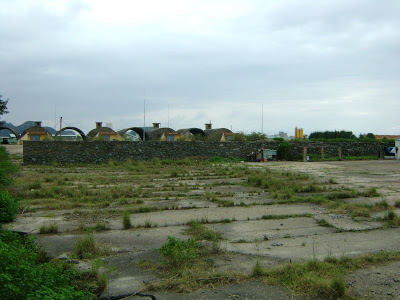 A small man in a green uniform and pith helmet frowned and asked me something in Vietnamese. I tried to put on my best Mrs. Brady face. “I got separated from my tour group. Tourist!” I said, pointing to myself. I tried to look worried, sorry and stupid, apologized, and walked back toward the runway and gate. He frowned after me, made a phone call, then zoomed after me. Another torrent of Vietnamese. I shrugged and smiled and looked worried and pointed to the gate where scooters continued to zip in and out.
A small man in a green uniform and pith helmet frowned and asked me something in Vietnamese. I tried to put on my best Mrs. Brady face. “I got separated from my tour group. Tourist!” I said, pointing to myself. I tried to look worried, sorry and stupid, apologized, and walked back toward the runway and gate. He frowned after me, made a phone call, then zoomed after me. Another torrent of Vietnamese. I shrugged and smiled and looked worried and pointed to the gate where scooters continued to zip in and out.
“My car. My driver,” I said, pantomiming driving.
He grunted and frowned. Another guy in uniform ran up; we were soon joined by a third. The second and third guys had ridden by us on a scooter earlier, smiling and saying, “Hello!” Now they looked somber and affronted by my presence. I think they were supposed to be guarding the gate. I started walking again, trying to cross back over the runway, but the oldest man in the green uniform stretched out his hands and commanded, “No! No!!” He and the other soldiers talked into their walkie-talkies. At this point I figured we weren’t in any trouble. I mean, what would they want with me?
I stood there while they frowned and talked into their radios until finally Chris and the guide came back toward the runway from wherever they’d been. “Tourists!” I said again, pointing to Chris, myself, then back to the car a little ways out the gate. “Car. Driver.” The guide spoke briefly with the guards, then said, “Walk.”
We crossed the runway and were maybe 100 yards from the still-open gate when we were halted again. Our guide and the older uniform had a spirited conversation, and again our guide instructed us to keep walking. So we did, against the soldiers’ protests. The more outraged-looking of the two young guards ran ahead of us and swung the gate closed while the older one shouted. More guys on scooters showed up.
“What’s the problem?” Chris asked our guide. “We’re not supposed to be here,” the guide said. “Little bit of trouble.”
More heated conversations in Vietnamese. The outraged young guard found a thick, rusting chain in the guard shack and looped it through the gate, locking us in. That’s when I realized we were in more than a little trouble. One of the newly-arrived soldiers, a man dressed in black combat gear with about six long, scraggly hairs on his chin, stopped the guard from locking it; civilians on scooters continued to use the gate, staring at us and the soldiers as they passed. The man in black instructed us to move away from the gate to the (previously unmanned) guard tower. The non-aggressive young guard slunk in and moved some things around as if he’d been there all afternoon, watching the situation develop with discreet glances up from downcast eyes. As we walked toward the guard tower our guide muttered under his breath, “Delete all photos of the base. You are Australian tourists. That’s what I told them.”
Another man in a green and white uniform wearing an impressive hat arrived with an entourage; an officer had arrived to determine our fate. He looked grave, but not mean, like the outraged guard pacing in front of the blocked gate. A still more heated conversation ensued between one of the other soldiers and our guide. Now he looked scared to the point of panic as he wildly gestured that the gates had been wide open. He was breathing hard and couldn’t stand still. The soldiers got back on their cell phones and walkie-talkies, conferring gravely and eyeing Chris and me. Our guide’s unease told us the situation was getting worse, not better.
“What’s going on?” asked Chris. “Before a little trouble,” the guide said tensely. “Now big trouble. Big trouble. Very big trouble.” “Are we going to get arrested?” Chris asked. The guide inhaled and cocked his head to the side. He didn’t say anything. He didn’t have to.
The guards swarmed around us again. Chris addressed the officer who seemed to be in charge and the man in black: “No photos. No photos. You can search me, search her bag—please. No photos. Just a mistake.” I didn’t think this was the right time to tell Chris I’d picked up a piece of runway for his dad. With guards on all sides there was no way to discretely dump it. Instead, I got out my camera. I’d been trying to delete pictures of the base when no one was watching, but it was taking too long and I didn’t want to make the situation worse by having my camera out. So I did the only thing I had time to do: I deleted all the pictures I’d taken that day (these photos were taken a few days before when we stopped to see the base from the road). Here we were, detained by communist military guards on a former-American base in Vietnam and possibly about to be arrested. We had no bargaining chips, and if they made me wipe my camera card—or worse, confiscated my camera—I’d lose half my photos. And that’s if they ever let us go. We’d already been detained more than half an hour.
“Well Lord,” I prayed, “We’ve really done it this time. Help! Help help help help help!”
The dumb tourist routine wasn’t working so I tried a new tactic. Honestly, it was only half tactic. The guards were all shaking their heads and looking severe. I put my hands to my face, stricken and upset. “Our flight leaves today!” I wailed. “Today we go to the airport! We left our hotel in Hoi An! We go to the airport! Big mistake! Big mistake!” Our guide translated some of this for the officer in charge. “Hoi An,” the officer repeated. “Yes! Hoi An!” Chris said, showing him his empty camera card. “Hoi An!” I said, scrolling through photo after photo of water buffalo, rice paddies and Hoi An landmarks. “Hoi An! Hoi An! Hoi An!” The officer looked at my photos, then watched my face intently. He turned away and the discussion continued.
Our guide was pacing, his hands in his hair. Chris and I were seeing our lives flash before our eyes. Any “ha ha oops” I’d initially felt was long gone—here we were on a former-American base surrounded by at least 10 uniformed Vietnamese, with a panicking guide who thought we were all going to jail. And what if they searched my bag and found the runway piece? What if—at a minimum—they decided they needed to see some ID? Any ID we could show them would crumble our guide’s story of our Australian nationality. If they found out our guide lied to them, then what? And what if they searched Chris and found his military ID, identifying him not only as an American, but a Naval Officer? SOL any way you looked at it. Way too many people had gotten involved for this to resolve simply. What would that mean for our flight? Getting home? Chris’ career?
Then, just like that, the officer barked an order. “You can go,” our guide said so softly I didn’t think I’d heard him correctly. “We can go?” Chris asked. None of the soldiers moved to open the gate. “Just go,” said the guide. “Walk. Quickly.” We moved toward the gate. The officer blocked my path, reached out his hand—and shook my mine. Right behind me, Chris shook his hand. Two soldiers reluctantly cracked open the gate; we passed through and went straight to the car, not stopping for traffic, letting it swirl around us, honking. “Just walk. Just walk,” our guide kept repeating. 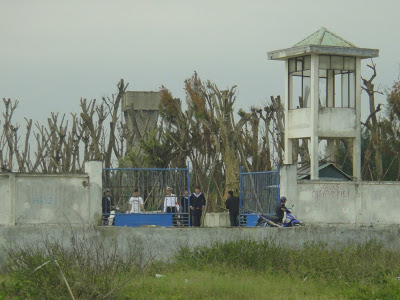 I felt light-headed and sick as I sank into the back seat, but I couldn’t resist just one clandestine snapshot of all the soldiers standing at the gate, still debating. We exhaled shouts of relief as we pulled into traffic and left the base and our 90-minute detour behind. Then our guide told us the truth: if he’d told them we were Americans, we all would have been arrested and he would have been fired and had his tourism license revoked. The only reason they released us was that the gate was open and unattended; the guard assigned to it had left his post without authorization. We all sat in a shivering, sickly silence. Then our guide announced, “Now, we have lunch!”
I felt light-headed and sick as I sank into the back seat, but I couldn’t resist just one clandestine snapshot of all the soldiers standing at the gate, still debating. We exhaled shouts of relief as we pulled into traffic and left the base and our 90-minute detour behind. Then our guide told us the truth: if he’d told them we were Americans, we all would have been arrested and he would have been fired and had his tourism license revoked. The only reason they released us was that the gate was open and unattended; the guard assigned to it had left his post without authorization. We all sat in a shivering, sickly silence. Then our guide announced, “Now, we have lunch!” 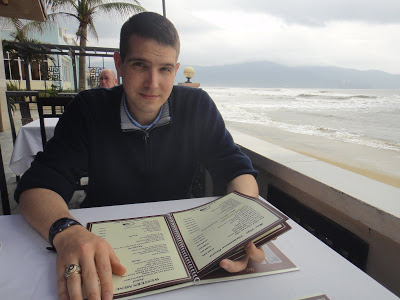
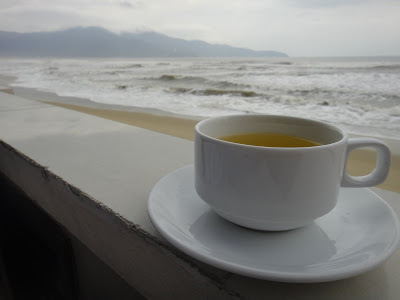 We had a soothing cup of tea at the Blue Whale on China Beach. Chris said, “What if they change their minds and wait for us at the airport?” I said, “You mean, wait for a couple of Australians at the airport?” “Still,” he said. I agreed. We changed clothes, I took off my hat and wore my hair differently, and we went through security separately for our flight from Da Nang to Ho Chi Minh City. Just in case international immigration was looking for two suspicious westerners, we went through that separately too. The man scanned my passport, frowned, clicked through his computer. Click, click, click. Chris was through. I waited nervously. Click, click, click. More frowning. He scanned it again and typed something, shrugged, stamped my passport and handed it back. Chris and I made eye contact across the security terminal. He winked. I finally relaxed a little after 10 hours of nervous anxiety. We’re definitely not the first Americans to be thankful to leave Vietnam. Chris and I met upstairs at a cafe overlooking the runway for one last Saigon Special beer and a toast to going home. Cheers to that!
We had a soothing cup of tea at the Blue Whale on China Beach. Chris said, “What if they change their minds and wait for us at the airport?” I said, “You mean, wait for a couple of Australians at the airport?” “Still,” he said. I agreed. We changed clothes, I took off my hat and wore my hair differently, and we went through security separately for our flight from Da Nang to Ho Chi Minh City. Just in case international immigration was looking for two suspicious westerners, we went through that separately too. The man scanned my passport, frowned, clicked through his computer. Click, click, click. Chris was through. I waited nervously. Click, click, click. More frowning. He scanned it again and typed something, shrugged, stamped my passport and handed it back. Chris and I made eye contact across the security terminal. He winked. I finally relaxed a little after 10 hours of nervous anxiety. We’re definitely not the first Americans to be thankful to leave Vietnam. Chris and I met upstairs at a cafe overlooking the runway for one last Saigon Special beer and a toast to going home. Cheers to that! 